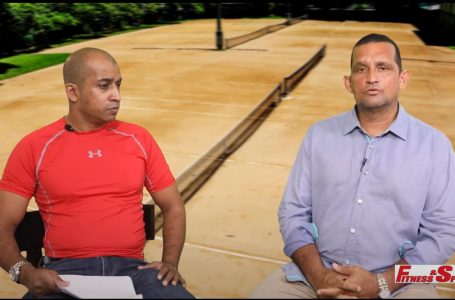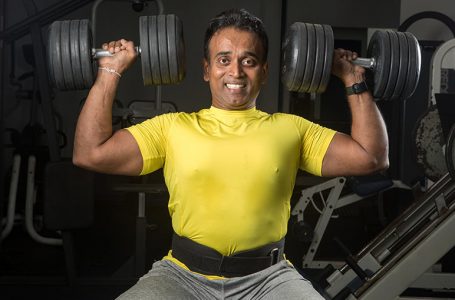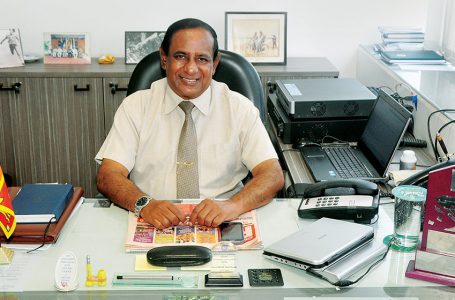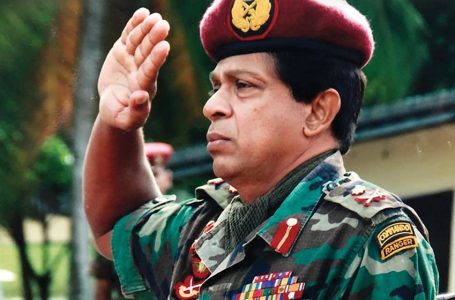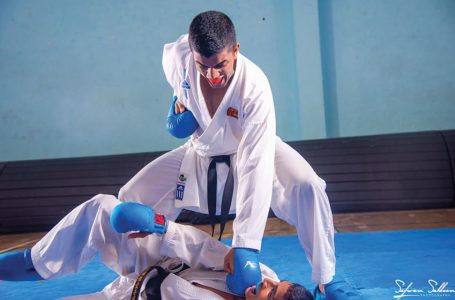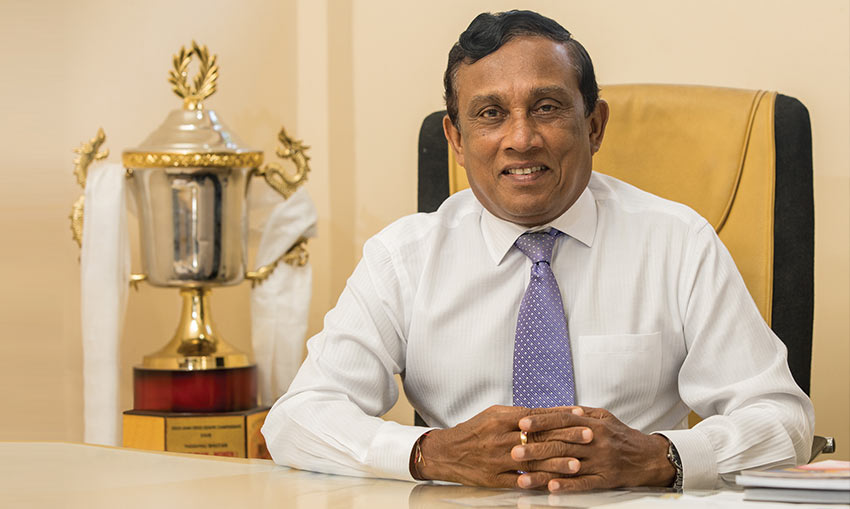
General Palitha Fernando is no stranger to athletics in Sri Lanka. He was an outstanding athlete at school and in the Sri Lanka Army. General Fernando has been at the helm of athletics in the Sri Lanka Army and has done much to uplift the sport in the army. General Fernando is the current President of the Athletics Association of Sri Lanka, a position he has held before. Sri Lanka has produced outstanding athletes who have won medals at prominent world meets including the hallowed Olympic Games. Sri Lanka has immense potential to shine in this sport and produce another Olympic Medalist in the future. Fitness & Sports’ interview with General Palitha Fernando presents his vision and plan to take our athletics to great heights.
Fitness & Sports: Describe your role as the President of the Athletic Association of Sri Lanka?
General Fernando: As the President of the Athletic Association of Sri Lanka I am tasked with the responsibility of developing and promoting athletics in Sri Lanka and to make sure that we (Sri Lanka) is well represented in all international athletic events. It falls under the purview of the Athletic Association to nominate the best athletes to represent Sri Lanka at these international events and do our country proud. My other duties involve presiding over committee meetings and conducting the meetings as per the agenda given with the aim of taking athletics in Sri Lanka to greater heights.
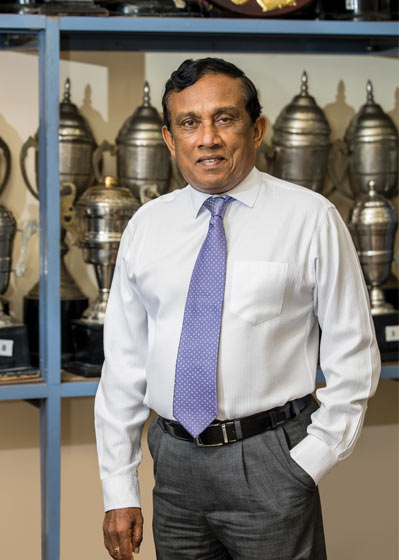 We have 7 Vice Presidents in the Athletic Association of Sri Lanka. One Vice President is fully assigned to find new talent in Sri Lanka especially the young talent. Our youngsters at the tender age of Under 16, Under 18, Under 19 and Under 20 have performed very well. One of my main tasks is to groom these youngsters to the senior level. We have found in the recent past that this is not happening well. We have sought the Ministry Of Sports to help take these young athletes forward and to make sure that they win medals in the international arena.
We have 7 Vice Presidents in the Athletic Association of Sri Lanka. One Vice President is fully assigned to find new talent in Sri Lanka especially the young talent. Our youngsters at the tender age of Under 16, Under 18, Under 19 and Under 20 have performed very well. One of my main tasks is to groom these youngsters to the senior level. We have found in the recent past that this is not happening well. We have sought the Ministry Of Sports to help take these young athletes forward and to make sure that they win medals in the international arena.
F&S: Can you tell us about your experience as an athlete at school and in the Army, what were your favourite events?
GF: In school I started athletics when I was 15 years old. Prior to that I had not done any track or field events. At the age of 16 I represented Sri Sumanagala College, Panadura in the 400 metres and 800 metres events respectively. I won both these events at the Zonal and District levels. I represented my school at the Public Schools as well. When I reached Under 19 I represented the school in both the 400m and 800m events. I won a Silver Medal at the Junior Nationals. Then at the Cadet Corps Regimental Meet I won a Gold Medal. At the All Ceylon Meet in 1970 I won both the 400m and 800m events. That was my school athletic career.
When I joined the Sri Lanka Army my first 2 years consisted of military training. During this period I did not have the opportunity to participate in any athletic competitions. However at the Military Academy there was an Inter Platoon Competition and in that competition I won the 800m. The instructor there said that I should go and train with the Army Athletics Team and that I should represent the Army in the 800m event. At that time we were trained by Dr. A. A.D Perera who had just returned from Germany with a Doctorate in Physical Education. I represented the Army 800m Relay Team and we established a new Sri Lanka Record in 1973 at the Relay Carnival. The members of our relay team were M.A. Abeyratne, Jayasiri, Martinus and myself. I ran the first lap. As an Officer it was very difficult in those days to continue in athletics so I moved to administration duties. I started managing the athletics team of our unit.
F&S: From your experience in athletics, when is the right age to begin athletics and what does the early training involve?
GF: I feel that Under 16 is the best age to begin a structured athletic program. Before that the children should play different sports and be active. They can go to the grounds and just run around without following a structured coaching program. When the child comes to the Under 16 age group and is interested in athletics then the coaches must decide what athletic event would best suit the child. If it is done this way then we (Athletic Federation) can pick up the promising young athletes and groom them for a great athletic career. We have found that most young athletes who do very well at the junior level tend to give up athletics when they reach the senior level or they just fail to perform. In other words they burn out physically and psychologically.
In 2012, we held the Asian Junior Athletic Championships in Colombo and we won 7 medals. All those 7 medalists have now given up athletics. That is a sad situation which we want to prevent. Before Under 16 it is important that the children concentrate on overall physical fitness without specializing. At the young age children should not train for all 7 days instead 4 days a week of sports and overall physical fitness is ideal. Competitive athletics should start at the age of 15+ years.
F&S: When and how would you identify the specific event that will best suit a young athlete?
GF: When the child reaches the age of 15+ we can identify the particular event that the child will be good at. We can do that by having competitive tests and then select which event would suit the child best. Then the coach will groom the child to compete in that specific event. The coach will be a specialist in that specific event whether it be sprinting, distance running, jumping or throwing. I will stress that a child should do the training suitable for his/her age and not be overloaded with training. For example a 16 year old should not do the training of a 20 year old. This will lead to physical and mental stress in the child and the child will give up athletics. We don’t want this to happen so we must bear this in mind and train the child accordingly to his/her age geared to the specific event.
F&S: Describe your experience as an Officer in the Sri Lanka Army and how this helps you in your leadership role as the President of Athletics in Sri Lanka?
GF: I started my Army career as an athlete in the Army and then I was appointed as Secretary to the Athletics Committee in the Army. In this role I learnt general management. I was working under fine Officers like General S.B. Meyanadiniya and General Athukorale who were very good administrators. They were also former athletes (sprinters). They guided us how to manage an athletics competition and the overall administration of athletics. These good gentlemen taught us these valuable skills. We had a good team that could implement what needed to be done at the time. In the Army if you delegate a task to somebody you can be rest assured that the task would be done. Things get done in the Army. As a result I am used to working that way. Later I was appointed as the Chairman of Army Athletics, then the Army Sports Officer. I had the freedom to do my tasks to the best of my ability. It was during the war when General Gerry De Silva the Commander of the Army at the time called me and said “We can’t continue with only Men’s Athletics, we have a large number of female cadres in the Army so start a good Women’s Athletics Team.” That was how the Army managed to get athletes like Susanthika Jayasinghe, Tamara Samandeepika, Dilhani Rupasinghe, B.G Chandralatha and all these good female athletes into the Army and build a very strong athletic contingent in the Sri Lanka Army. No one could match that particular Army Athletic Team. At the same time we had very good athletes in the Army Men’s Athletic Team also. Athletes like Chinthaka Soysa, A.R. Ratnayake, Jayasundera, Amarasekera were top athletes who were in the Army Men’s Team. Any Sri Lanka sports contingent going out of Sri Lanka for International Meets had a majority of Army personnel. This shows that the Army system and administration of athletics in the Army was correct. Our Army personnel won World Medals whether it be the Olympics, Commonwealth Games, Asian Games or any International Meet our Army personnel brought medals. The Sri Lanka Army is the best place to learn leadership, administration, general management and most importantly to become a disciplined person. A person who is disciplined is always good for the society and the country.
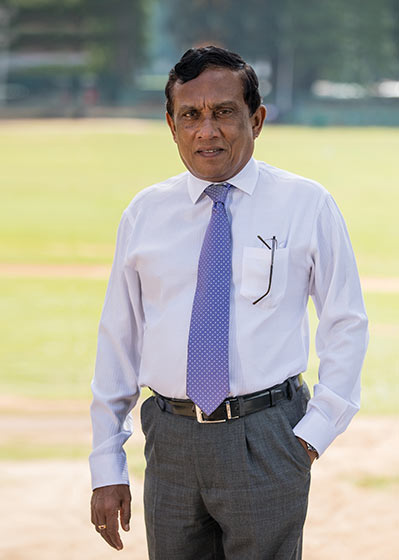 The Army system is the best system to create a disciplined society. For example the university students were introduced a leadership training program conducted by the Sri Lanka Army. Initially the parents were not in favour of this programme but when we started the programme and were half way, all the students liked this programme and wanted the programme extended. That shows that the Army system is always correct. For an athlete who joins the Army the athlete has total freedom to focus on his/her athletic career. Based on their athletic performance the Army will give promotions. A good example is W. Wimaldasa who joined as a Recruit and he left as a Lietenant Colonel. The Army is the best place to groom talent in the country.
The Army system is the best system to create a disciplined society. For example the university students were introduced a leadership training program conducted by the Sri Lanka Army. Initially the parents were not in favour of this programme but when we started the programme and were half way, all the students liked this programme and wanted the programme extended. That shows that the Army system is always correct. For an athlete who joins the Army the athlete has total freedom to focus on his/her athletic career. Based on their athletic performance the Army will give promotions. A good example is W. Wimaldasa who joined as a Recruit and he left as a Lietenant Colonel. The Army is the best place to groom talent in the country.
F&S: In what specific athletic events do you see Sri Lanka having the most potential for success in the international arena and why?
GF: Sri Lanka has had very good sprinters. Susanthika Jayasinghe, Damayanthi Dharsha, Sugath Thilakaratne, Rohan Pradeep Kumara, H. Ratnayake, Amarasekera, Jayasundera were all very good sprinters. This trend started only after 1997 when Susanthika won the Silver Medal at the World Championships in Athens. Prior to this Sri Lanka had very good long distance runners. Namely, S.L.B Rosa, Anuradha Indrajit Cooray, Wimalasena Perera were very good long distance athletes. At present we have found that it is better to focus on jumping (both vertical and horizontal jumps) and sprint events. Today we have 10 athletes doing over 7.75m in the long jump. There are 5 athletes doing over 8m. In the triple jump we have over 6 athletes doing over 16m. In the 400m we have about 7 athletes doing under 47 seconds. We need to train, guide and motivate our 400m athletes to achieve a time of under 46 seconds. It is the role of the coach to help the athletes achieve this. We the Sri Lanka Athletic Association can assist the coaches by conducting training programmes to achieve their goals. At the last Asian Junior Championships Sri Lanka Men won 3 Gold Medals in the 400m, 3000m Steeple Chase and the 4 by 400m relay. In the Women’s category we won Silver Medals in the sprint events. The 100m, 200m and 400m. We also have some rare talented athletes who can win medals for Sri Lanka both in the Men’s and Women’s categories in the long distance events. Especially in the Women’s category. We found Parami Maristella from Kuliyapitiya Central College who is ranked 3rd in the world in the 2000m Steeple Chase in the Under 18 category. She won the Gold Medal in the 3000m Steeple Chase, at the Asian Junior Championships and she missed the Asian Junior Championship Record by 0.50 seconds. There is another schoolboy from Royal College in the Under 18 category he cleared a high jump of 2.14m. He is ranked 3rd in the world in his age category. We are expecting Medals from both these athletes at the Buonos Aires Youth Olympic Games in October. We do have talented athletes. The biggest task we have is to take these young athletes forward and win medals at the senior level in the international arena. To do this we need to support and guide the coaches who in turn will guide the athletes and help them better their personal bests to achieve the desired results at the world stage. At the moment we are getting the maximum support from the Sports Minister. The Minister has arranged a very good sponsorship package for the 9 athletes that won medals at the recent Asian Junior Athletic Championships. And he (Minister) wants us (Athletics Association) to take these youth athletes forward to the 2024 Olympic Games in Paris. We have 6 years to achieve this. If we all work together we can definitely take at least 3 of these 9 athletes to the Olympics in 2024.
F&S: How do we identify the talent in our villages where the children are very active as part of their daily lives and how do we develop them to become world class athletes?
GF: Our system in Sri Lanka to find talent is one of the best systems in the world. We have Circuit Meets where around 40 to 50 schools participate. We have District Meets, Provincial Meets, All Island Competitions in addition we have 2 more All Island Competitions conducted by the School’s Athletic Association. That is how we identify the talent in the children at the junior level. For the seniors we have a similar arrangement. The seniors have a Circuit Meet, Zonal Meet, District Meet, Provincial Meet, the National Sports Festival, we (Athletic Association) conduct the National Championships, the Youth Services conduct another Athletic Championships on a very large scale, so all these meets are there for us the Athletic Association to identify talented athletes in our country in both the junior and senior level which we do. But to develop this talent and guide these athletes then they should come under us the Athletic Association. Our system is such that we don’t have the wherewithal to do that part. My personal view is the Sports Development of the Ministry of Sports has to do that part. We need to have a system to bring the athletes under good coaches for the specific events to give them the correct guidance that they need to come up to international standards. We need to have provincial and district level coaches for this purpose. So we the Athletic Association needs to sit down and have a big discussion with the Sports Ministry, the Education Ministry to create a good system to groom the raw talent that we have amongst these children and groom them for the future.
F&S: What is your vision for Sri Lanka Athletics, what initiatives would you propose and what support do you need so we may reach great heights?
GF: We want to win at least 2 or 3 Olympic Medals and World Championship Medals. We are targeting the 2024 Olympics in Paris. We have 6 years to work to achieve this target.


